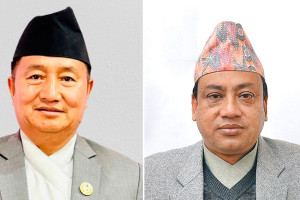Editorial
Got the guts?
RSP lawmakers have a chance to set a sterling precedent by rejecting CDF funds for its lawmakers.
That the Local Infrastructure Development Partnership Programme, infamously known as the Constituency Development Fund, is nothing but an agent of inefficiency and corruption needs no explanation today. From the Auditor General’s report to the admissions of a few responsible lawmakers, everyone who has a sense understands its futility. If there is only one ground that still wants the controversial programme to continue, it is the greedy lawmakers and their foot soldiers who want to misuse the fund. Financial corruption is only one of the myriad problems the programme brings. It allows for a haphazard allocation of funds for infrastructure development, now known across the country as bulldozer bikas. Spent by the lawmakers at their whim, the funds help build roads that lead nowhere and bridges that do not withstand torrents. And yet, Finance Minister Prakash Sharan Mahat chose to bring from the dead a sorely unnecessary programme that punches a hole in the state coffers in these financially desperate times.
While Mahat’s Nepali Congress and other major political parties have failed to oppose the programme that undercuts the idea of financial prudence, the Rastriya Swatantra Party has been an outlier in this issue. The novice party, which made the fight against corruption one of its main electoral agendas and hit the right chord with the people, has rightly moved a resolution motion in the Parliament Secretariat to scrap the controversial programme. The biggest statement the party can make in this regard, though, is that its lawmakers will forthrightly reject the Rs50 million each that they would get to spend on the projects of their choice. Doing so will prove that the party is not opposing the programme for public consumption but is seriously concerned about righting what is sorely wrong.
As of now, senior RSP officials have failed to specify whether the party’s lawmakers will unanimously decide to reject the fund if their resolution in Parliament does not get through. The directly elected lawmakers who, in their electoral speeches, made tall claims about bringing development to their constituencies would find themselves hard-pressed to advocate scrapping the fund, as they have promises to keep. But if the RSP does take a strong principled stand, it not only stands to win the hearts of the people but also claim the moral high ground in contemporary Nepali politics, often characterised by the betrayal of the people’s mandate. Other political parties will then be under pressure to reject the fund too. After all, the forceful entry of the RSP into Nepali politics from the November general elections has made it clear that undermining people's concerns is not an option anymore.
The most important thing that the RSP must do, though, is to establish that the programme has no relevance in contemporary Nepal. Started in 1994 with a sum of Rs250,000 per constituency under a monarchical, unitary political system, the programme has now become irrelevant, as it has become financially unviable in federal Nepal. What is outrageous is that provincial levels, which came into existence as decentralised alternatives to the centre, have now emulated the wrongdoings of the centre itself. At a time when local development has already been established as the prerogative of the local level, the idea of providing funds to lawmakers is not just an affront to the idea of federalism but also technically wrong, as it leads to haphazard and unplanned development. Moreover, although there is no constitutional ambiguity about the role of lawmakers, they have often presented themselves as agents of development. Lawmakers should focus on making laws rather than manufacturing lies about their public roles. Over to Rabi Lamichhane and company then.




 26.43°C Kathmandu
26.43°C Kathmandu
















